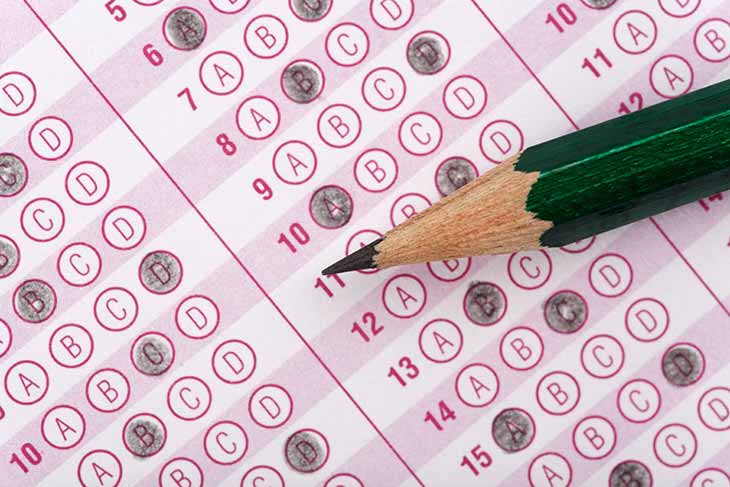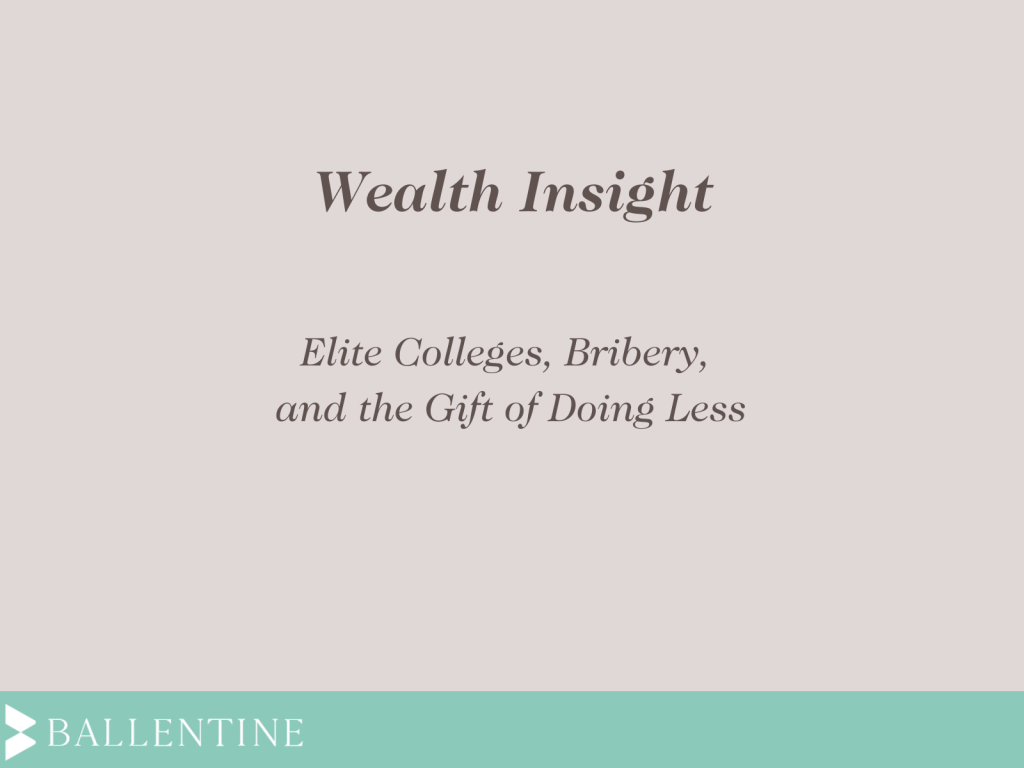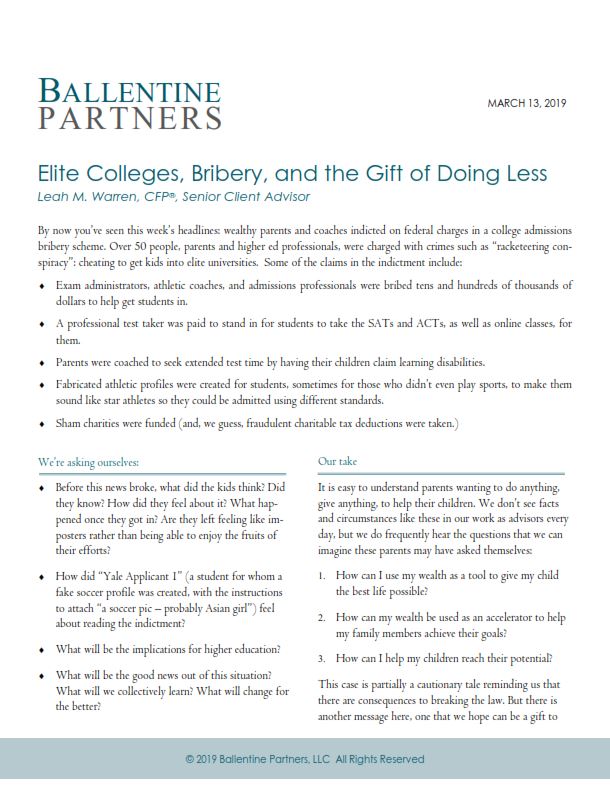 By now you’ve seen this week’s headlines: wealthy parents and coaches indicted on federal charges in a college admissions bribery scheme. Over 50 people, parents and higher ed professionals, were charged with “racketeering conspiracy”: cheating to get kids into elite universities. Some of the claims in the indictment include:
By now you’ve seen this week’s headlines: wealthy parents and coaches indicted on federal charges in a college admissions bribery scheme. Over 50 people, parents and higher ed professionals, were charged with “racketeering conspiracy”: cheating to get kids into elite universities. Some of the claims in the indictment include:
- Exam administrators, athletic coaches, and admissions professionals were bribed tens and hundreds of thousands of dollars to help get students in.
- A professional test taker was paid to stand in for students to take the SATs and ACTs, as well as online classes, for them.
- Parents were coached to seek extended test time by having their children claim learning disabilities.
- Fabricated athletic profiles were created for students,sometimes for those who didn’t even play sports, to make them sound like star athletes so they could be admitted using different standards.
- Sham charities were funded (and, we guess, fraudulent charitable tax deductions taken).
We’re asking ourselves:
- Before this news broke, what did the kids think? Did they know? How did they feel about it? What happened once they got in? Are they left feeling like imposters rather than being able to enjoy the fruits of their efforts?
- How did “Yale Applicant 1” (a student for whom a fake soccer profile was created, with the instructions to attach “a soccer pic – probably Asian girl”) feel about reading the indictment?
- What will be the implications for higher education?
- What will be the good news out of this situation? What will we collectively learn? What will change for the better?
Our take
It is easy to understand parents wanting to do anything, give anything, to help their children. We don’t see facts and circumstances like these in our work as advisors every day, but we do frequently hear the questions that we can imagine these parents may have asked themselves:
- How can I use my wealth as a tool to give my child the best life possible?
- How can my wealth be used as an accelerator to help my family members achieve their goals?
- How can I help my children reach their potential?
This case is partially a cautionary tale reminding us that there are consequences to breaking the law. But there is another message here, one that we hope can be a gift to parents everywhere: It is a reminder that doing more is not always the best you can give your child. Sometimes doing less is. This case is a gift because it brings that argument to its logical extreme.
“Is there a parent on earth – wealthy or not – who doesn’t want their child to be happy?” So opens Chapter 2 in the book Raised Healthy, Wealthy & Wise, written in 2014 by my colleague, Covie Edwards-Pitt. The book summarizes the lessons learned from a series of interviews with inheritors of significant wealth who grew up to be happy, healthy, and productive adults. What Covie learned through those interviews might be most concisely summarized by the title of Chapter 2: “Allow Your Child to Strive – Don’t Buy Their Success.” The whole book is worth a read so I won’t spoil it for you, but I will highlight some gems.
The book’s key messages are summarized in a letter at the end of the book written in the collective voice of the interviewees to their parents. A few choice quotes:
- “Although we might have asked you to do more to help us at the time, looking back we realize the most helpful thing you did was show us that you knew we could do it on our own. You were right.”
- “Although there were times when we struggled that were really painful for you to watch, what we take most from those experiences is the pride in ourselves that we made it through. And we know we will be able to make it through when we encounter other difficulties in our lives.”
- “It’s been so important in our lives for us to be able to show people that we can make it on our own – that we earned our success and that it’s not just the result of our parents’ influence or affluence. Thank you for giving us the chance to prove that to ourselves and to the world.”
What successful adults cherish is the knowledge that they earned what they achieved. We fear that the students here were all robbed of this prize. Their well-intentioned parents, in trying to give their children a leg up, instead may have deprived them of far more valuable jewels: confidence and self-sufficiency.
Conclusions
We are hopeful that this case will yield some good news. We hope that parents everywhere see the parallels between this extreme example and the mundane, everyday questions of how to use money to best support their children in the direction of their potential. We hope it gives parents permission to do less, and we hope it gives kids some perspective that by doing less, their parents might be giving more (even if they realize this only once they’re adults).
Although we find the actions of these parents inexcusable, we have compassion for the emotional health of the families involved in this case. We hope they can be courageous in the face of a very public story, and that these parents can model for their children another very important lesson: how to learn from one’s mistakes and grow from them. Lessons like these are the best gifts we can give our children.
Learn more about Leah M. Warren, CFP®, Senior Client Advisor.
This report is the confidential work product of Ballentine Partners. Unauthorized distribution of this material is strictly prohibited.
The information in this report is deemed to be reliable but has not been independently verified. Some of the conclusions in this report are intended to be generalizations. The specific circumstances of an individual’s situation may require advice that is different from that reflected in this report. Furthermore, the advice reflected in this report is based on our opinion, and our opinion may change as new information becomes available.
Nothing in this presentation should be construed as an offer to sell or a solicitation of an offer to buy any securities. You should read the prospectus or offering memo before making any investment. You are solely responsible for any decision to invest in a private offering.
The investment recommendations contained in this document may not prove to be profitable, and the actual performance of any investment may not be as favorable as the expectations that are expressed in this document. There is no guarantee that the past performance of any investment will continue in the future.





